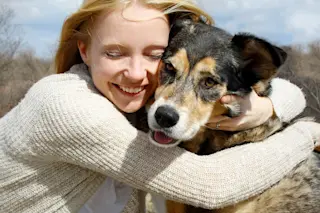This dog doesn't exactly look thrilled. (Credit: Christin Lola/Shutterstock) It's hard to resist wrapping your arms around a furry pup, but our well-intentioned hugs might be stressing dogs out. While it's natural for us to demonstrate caring by wrapping our arms around our companions, such behavior is likely activating a primal stress response in dogs, says Stanley Coren, a professor of psychology at the University of British Columbia who specializes in canine psychology. When it comes time to choose between fighting and fleeing in a stressful situation, dogs are cursorial creatures, meaning they are naturally disposed to running away, he says. When we grab them in an embrace and hold on tight, they feel anxious and constrained, because there's nowhere to run. In other words, our behavior communicates the opposite of what we intended.
Coren studied 250 pictures of dogs getting hugs from humans, and looked for telltale signs of ...














